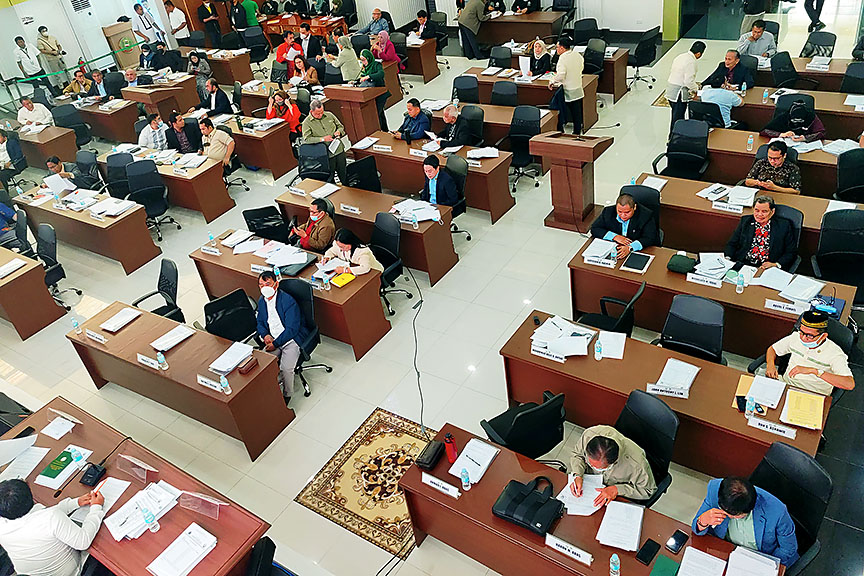COTABATO CITY (MindaNews / 18 January) – The requirement to have at least 10,000 members to register as a political party in the Bangsamoro Autonomous Region in Muslim Mindanao (BARMM) is prohibitive and discriminatory, an independent panel made up mostly of lawyers said.
 The Bangsamoro Transition Authority (BTA) in session. MindaNews file photo by FERDINANDH CABRERA
The Bangsamoro Transition Authority (BTA) in session. MindaNews file photo by FERDINANDH CABRERA
In a recent position paper submitted to the Bangsamoro Transition Authority (BTA), the panel composed of representatives from the Institute for Autonomy and Governance (IAG), the Mindanao State University System, and the Local Government Development Institute (LGDI) asked the parliament to ease the membership requirement in the registration of political parties.
“The 10,000-member requirement is a very high standard that is prohibitive and discriminatory as it limits the registration of political parties and the right to participate in the election of party representatives to moneyed organizations or to those backed by rich political clans,” the paper, furnished to MindaNews, said.
The independent panel suggested for a progressive application of the membership requirement.
It said that for the first parliamentary elections in 2025, a political party should have 1,000 members without requiring presence in other provinces.
For the 2028 elections, membership requirement can be increased to 5,000 provided that the party must be present in at least two provinces – one province from mainland Mindanao (Lanao del Sur, Maguindanao del Sur, and Maguindanao del Norte) and one province from the island provinces of Basilan, Sulu, and Tawi-Tawi.
The 10,000-member requirement will then be implemented on the third elections with presence in majority of the provinces constituting the Bangsamoro, provided that the party should have presence in at least one province from mainland Mindanao and one province from the island provinces.
The BTA started last year the ongoing public consultations for the proposed Bangsamoro Electoral Code or Bill No. 29, one of the six priority measures that must be enacted in the transition period as prescribed by Republic Act 11054 or the Organic Law for the BARMM, popularly known as the Bangsamoro Organic Law.
Article V Section 3 of the proposed electoral code stated that political parties in the BARMM may be established by at least 10,000 residents of the territory of BARMM who have voting rights and who have given their consent for the establishment of only one political party through affixing their signatures in a duly notarized form, membership must be distributed as far as practicable to the different provinces and cities comprising the BARMM territory.
It further provides that every political party shall have established provincial and city chapters in all provinces and cities of BARMM, respectively, and municipal chapters in the majority of the municipalities comprising each province.
The panel said the 10,000-member requirement will place extreme administrative burden on the Bangsamoro Electoral Office in verifying the identities of the members.
The notarization of the individual consent forms could cost at least two million pesos, they said.
“This cost is economically prohibitive and discriminatory, with the effect of excluding small political parties and grassroots or community-based organizations,” the group stressed.
The current Integrated Bar of the Philippines standard rate for notarization ranges between P200 to P500.
Those who signed the position paper are Atty. Benedicto Bacani, IAG executive director; former Acting Justice Secretary Alberto Agra; Prof. Soraidah Ali, Dean of the College of Public Affairs of Mindanao State University; Atty. Luie Tito Guia, former COMELEC commissioner and senior lecturer at the La Salle University; Telibert Laoc, senior resident director for Elections and Civil Society Development for Asia; Atty. Emil Marañon, election lawyer and former COMELEC Chief of Staff; Atty. Anwar Malang, former Secretary of the Department of the Interior and Local Government (DILG) in the defunct Autonomous Region in Muslim Mindanao; and Prof. Mahid Rachman, Assistant Professor IV, Graduate Studies Department, College of Public Affairs of MSU.
The other panel members are Jonathan Malaya, former Undersecretary of the DILG and executive director of the Local Government Development Institute; Dr. Samuel Anonas, chair of the Political Studies Department of Mindanao State University System; Atty Jesus Doque, former director of the DILG Legal Services; Atty. Aminoden Macalandap, former president of the Integrated Bar of the Philippines Lanao del Sur chapter; and Atty. Jasmin Abdulrahman, lecturer at the College of Law of MSU.
Sulu 1st District Rep. Samier Tan also questioned the 10,000-membership requirement for a political party to be registered in the BARMM.
“Requiring that a political party be established with at least 10,000 residents is an undue limitation that violates the right to form associations and the right to self-organize for purposes not contrary to law guaranteed under Section 8, Article III (The Bill of Rights) of the Constitution,” he said in a separate position paper.
“The enlistment of members, including the number of members/residents, should be left to the decision of the political party and not be dictated by law or by any rule,” he added.
Tan said that requiring 10,000 residents to sign notarized membership forms “is effectively a form of compulsion.”
During the inauguration of the second BTA last September 15 graced by President Ferdinand Marcos Jr., Interim Chief Minister Ahod Ebrahim vowed to shepherd the passage of the electoral code “by the end of the year or the first quarter of 2023.”
The BTA already passed the administrative, education and civil service codes. The two other priority measures the body needs to pass in the transition period are the local governance and revenue codes.
The proposed electoral code seeks “to ensure honest, credible, just, and free elections, allowing democratic political participation and reflecting the genuine will of the electorate in the region.”
Under the proposed measure, the Parliament will be composed of 80 members, with 50% of the seats going to party representatives, 40% district representatives, and 10% reserved seats and sectoral representatives. (Bong S. Sarmiento / MindaNews)
